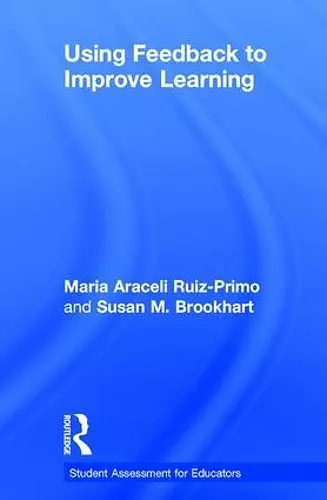Using Feedback to Improve Learning
Susan M Brookhart author Maria Araceli Ruiz-Primo author
Format:Hardback
Publisher:Taylor & Francis Ltd
Published:26th Oct '17
Currently unavailable, and unfortunately no date known when it will be back
This hardback is available in another edition too:
- Paperback£28.99(9781138646575)

Despite feedback‘s demonstratively positive effects on student performance, research on the specific components of successful feedback practice is in short supply. In Using Feedback to Improve Learning, Ruiz-Primo and Brookhart offer critical characteristics of feedback strategies to affirm classroom feedback’s positive effect on student learning. The book provides pre- and in-service teachers as well as educational researchers with empirically supported techniques for using feedback as a part of formative assessment in the classroom.
"In this book, Ruiz-Primo and Brookhart have created an indispensable synthesis of decades of rigorous research that deserves a prominent place on the desks of every formative assessment researcher. At the same time, the frameworks and vignettes of practice it contains are accessible and informative for classroom teachers striving to improve the nature, type, and quality of feedback that they provide to their students."
—Erin Marie Furtak, Associate Professor of Education, University of Colorado Boulder, USA
"My journey of discovery about feedback started from my experiences as an examiner. As I helped to implement terminal testing systems, I began to question the effects of the limited range of aims which were made prominent, and thereby powerful, in the questions that I helped to compose. I was thereby moved to think about their effects on the students I taught and about how I tried to help them by giving them advice, as their test preparation included the previous year’s testing attempts. So, some time before I had encountered or used the term formative assessment, I was actually practicing it. Over several years and with the help of many colleagues, I came to see that assessment, aims of learning, feedback effects on students’ learning, and accountability pressures on teachers were all inter-related, and that whilst there did exist helpful analyses of some of the conceptual and political issues, empirical research into the daily practices of teachers was lacking.
In retrospect, I can see that I was on a journey for which I was unable to choose between several different destinations. Moreover, I did not have a map of the territory into which I had wandered. In this book, Ruiz-Primo and Brookhart have provided both a clear map and have identified the most important destination. The title Using Feedback to Improve Learning signals the strength of the authors’ understanding, for it highlights the central aim of feedback. More subtly, it makes feedback, rather than assessment, the prominent noun—which is welcome, because assessment, in all its forms and at all levels, has to be valued in the light of its support for feedback.
I see this book as both timely and very helpful. Over the past twenty years, the study of formative assessment has grown so fast that ‘mushroomed’ or ‘exploded’ are appropriate metaphors. Each of the six chapters of this book draws on and lists about fifty references. However, these do not include all possible articles—because the authors have exercised a careful and very necessary discrimination in their selection of sources.
This book is eminently helpful because of the clarity and precision of its arguments and because of the insights of the authors which underlie the structure of their presentation. Their focus on learning is reflected in the arguments and evidence concerning the many contexts for formative assessment which they survey in detail. In particular, the text emphasizes both that students themselves learn from their interactions with the teacher and with one another, and that teachers should also learn from formative feedback as they reflect on the effects of their plans and on the on-the-fly decisions that they make as they steer a classroom discussion. For both teachers and students, learning can happen both from the immediate impact of events and in later reflection on the causes and outcomes of such events.
Overall, this book makes clear that formative assessment is far more than a helpful addition to the techniques of teaching. It is an integral component of pedagogy. In all forms and at all levels of teachers’ professional development, its centrality, and the features that can make its impact effective, should be made clear. This book is an excellent guide to and resource for the achievement of that purpose."
—Paul Black, Emeritus Professor of Education, King’s College London, UK
ISBN: 9781138646568
Dimensions: unknown
Weight: 440g
142 pages